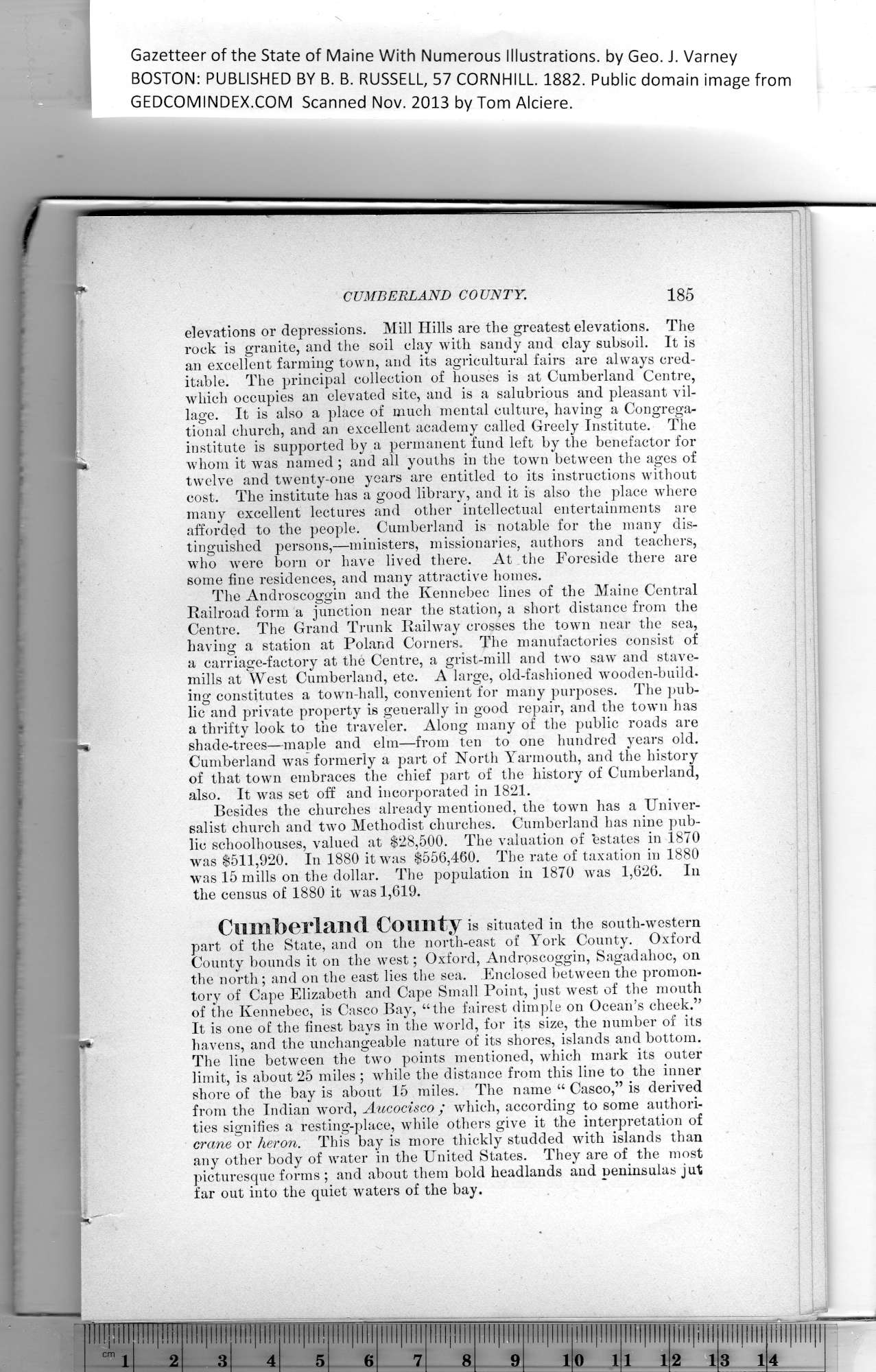|
Gazetteer of the State of Maine With Numerous Illustrations, by Geo. J. Varney
BOSTON. PUBLISHED BY B. B. RUSSELL, 57 CORNHILL. 1882. Public domain image from
CUMBERLAND COUNTY.
elevations or depressions. Mill Hills are the greatest elevations. The
rock is granite, and the soil clay with sandy and clay subsoil. It is
an excellent farming town, and its agricultural fairs are always cred-
itable. The principal collection of houses is at Cumberland Centre,
which occupies an elevated site, and is a salubrious and pleasant vil-
lage. It is also a place of much mental culture, having a Congrega-
tional church, and an excellent academy called Greely Institute. The
institute is supported by a permanent fund left by the benefactor for
whom it was named ; and all youths in the town between the ages of
twelve and twenty-one years are entitled to its instructions without
cost. The institute has a good library, and it is also the place where
many excellent lectures and other intellectual entertainments are
afforded to the people. Cumberland is notable for the many dis-
tinguished persons,—ministers, missionaries, authors and teachers,
who were born or have lived there. At the Foreside there are
some fine residences, and many attractive homes.
The Androscoggin and the Kennebec lines of the Maine Central
Railroad form a junction near the station, a short distance from the
Centre. The Grand Trunk Railway crosses the town near the sea,
having a station at Poland Corners. The manufactories consist of
a carriage-factory at the Centre, a grist-mill and two saw and stave-
mills at West Cumberland, etc. A large, old-fashioned wooden-build-
ing constitutes a town-hall, convenient for many purposes. The pub-
lic and private property is generally in good repair, and the town has
a thrifty look to the traveler. Along many of the public roads are
shade-trees—maple and elm—from ten to one hundred years old.
Cumberland was formerly a part of North Yarmouth, and the history
of that town embraces the chief part of the history of Cumberland,
also. It was set off and incorporated in 1821.
Besides the churches already mentioned, the town has a Univer-
salist church and two Methodist churches. Cumberland has nine pub-
lic schoolhouses, valued at $28,500. The valuation of 'estates in 1870
was $511,920. In 1880 it was $556,460. The rate of taxation in 1880
was 15 mills on the dollar. The population in 1870 was 1,626. In
the census of 1880 it was 1,619.
Cumberland County is situated in the south-western
part of the State, and on the north-east of York County. Oxford
County bounds it on the west; Oxford, Androscoggin, Sagadahoc, on
the north; and on the east lies the sea. Enclosed between the promon-
tory of Cape Elizabeth and Cape Small Point, just west of the mouth
of the Kennebec, is Casco Bay, “the fairest dimple on Ocean’s cheek.”
It is one of the finest bays in the world, for its size, the number of its
havens, and the unchangeable nature of its shores, islands and bottom.
The line between the two points mentioned, which mark its outer
limit, is about 25 miles; while the distance from this line to the inner
shore of the bay is about 15 miles. The name “ Casco,” is derived
from the Indian word, Aucocisco ; which, according to some authori-
ties signifies a resting-place, while others give it the interpretation of
crane or heron. This bay is more thickly studded with islands than
any other body of water in the United States. They are of the most
picturesque forms ; and ahout them bold headlands and peninsulas jut
far out into the quiet waters of the bay.
|
,lllllllll |
lilijiiii |
l!l!|llli |
ll!l|lli! |
Dll llii |
III! Illl |
lllllllll |
!lll|!lll |
lllllllll |
lllllllll |
lllllllll |
llll|llll |
lllllllll |
llll|llll|l |
|
2 |
L 3 |
4 |
5 |
6 |
7 |
8 |
9 |
1 |
0 1 |
1 1 |
2 1 |
3 1 |
4 |
PREVIOUS PAGE ... NEXT PAGE
This page was written in HTML using a program written in Python 3.2
|
